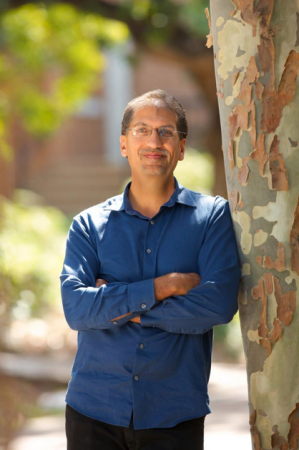This event has been canceled. We hope to reschedule sometime in the future.

The College of Computing is pleased to present a lecture by Dr. Frank Vahid. Vahid’s talk, “Teaching lower-division CS/CE: Our improvement experiences and research results for physical and online courses,” relates the story of University of California Riverside (UCR) successful efforts to improve introductory CS courses over the past decade.
Vahid is a professor of computer science and engineering at UCR, and co-founder and chief learning officer of zyBooks.
Vahid’s research focuses on improving college-level CS/CE/STEM education, and embedded systems. He is the author of textbooks from Wiley, Pearson, and zyBooks on topics including C++, C, Java, data structures, digital design, computer organization, embedded systems, computing technology, and introductory math and algebra.
Many universities seek to improve introductory computer science courses, and to offer online courses. Dr. Vahid and his colleagues at UCR have had particular success introducing changes to their teaching methods.
Before improvements, UCR intro courses fell into the common U-shaped grade distribution with a high fail/withdraw rate. After introducing changes–including the replacement of textbooks with web-native interactive, animated content and questions–the grade distribution now looks like a rising staircase (with DFWs on the left and As on the right). Good student performance in subsequent courses and highly-positive course evaluations from both majors and non-majors were received at a school with high enrollments of low-income, first-generation, and minority students.
Additional UCR course modifications include using the interactive content to encourage class preparation, reserving class time for extensive live coding of examples (with lots of mistakes made) and peer instruction; teaching the Coral language before C++, and switching from one-large-program each week to many small programs–enabled by auto-grading.
UCR started teaching online versions of CS1 and CS2 courses in 2013, making refinements over the years, such as synchronous online scheduled lectures and labs and extensive use of online chat. The modifications have led to students in online sections doing as well as students in physical sections, with equally high course evaluations (and many stating a preference for online). The model has been reproduced at other schools.
In 2012, Vahid and his colleagues formed zyBooks, a company to provide scalable growth and continual professional improvement of UCR’s online content and platform. The zyBooks platform and content has grown to serve over 500,000 students at 600 universities in the U.S.
Vahid has received several teaching awards, including UCR Engineering’s Outstanding Teacher award and UCR’s Innovative Teaching award, both in 2017. In recent years, he has spoken about CS/CE education at over 50 universities across the country.
Vahid’s work has been supported by the National Science Foundation, (university and NIH Small Business Innovation Research (SBIR) grants), the Semiconductor Research Corporation (SRC), the U.S. Dept. of Education (university and SBIR grants), and companies including Google and Intel. He received his B.S. in computer engineering from the University of Illinois at Urbana/Champaign, and his M.S. and Ph.D. from the University of California, Irvine.
Vahid has spoken at dozens of U.S. college of universities about UCR’s research, such as the following, in no particular order: Texas A&M, Univ. of Illinois Urbana/Champaign, Univ. of Florida, Univ. of Texas (Austin), UT San Antonio, Florida International Univ., Florida Atlantic Univ., Miami Univ., Miami Dade Community College, Drexel, Tufts, Univ. of Massachusetts Lowell, The College of New Jersey, Southern New Hampshire Univ., Univ. of Minnesota Twin Cities, Univ. of Minnesota Duluth, Michigan State Univ. Central Michigan Univ., Indiana State Univ., California State Univ. Northridge, California State Univ. Fresno, San Jose State Univ., Univ. of New Mexico, New Mexico State Univ., Univ of Alabama Birmingham, Univ. of Alabama Tuscaloosa, Lone Star College, UT Rio Grande Valley, Boston Univ., Rutgers, New Jersey Institute of Technology, Jacksonville State Univ., and more…
“Plus many many dozens of virtual presentations. It’s been an absolute honor and privilege to visit each department and to meet each and every faculty member, and students too,” Vahid said.